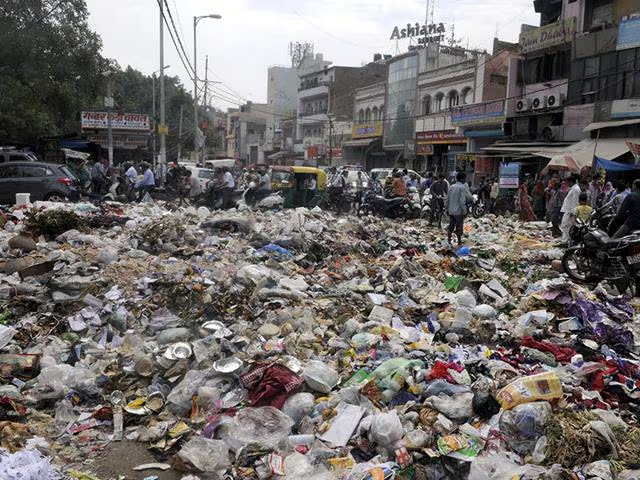City Managers Need to Buckle Up to Ensure Waste Management
- Tick All Places for Primary and Secondary Waste Points:
A comprehensive checklist for waste management points should be prepared by subject matter experts. This will instill a sense of responsibility towards public hygiene. Citizens must also remain vigilant and take ownership of maintaining their surroundings.
- Plan Waste Lifting to Every Last Detail:
To uphold public hygiene and safety, waste collection points should be organized with meticulous planning. Every detail must be examined closely. The administration should establish clear regulatory “Dos & Don’ts” for waste collection, ensuring compliance by both citizens and waste management staff.
- Ban Proprietors Found at Fault for Waste Littering:
Authorities must enforce strict inspections to identify instances of improper waste disposal. Designated officials should conduct regular checks, imposing hefty fines on violators and permanently banning proprietors found guilty of repeated offenses. However, authorities should also promote permanent alternatives to address systemic waste issues.
- Hire Experts for Inspections:
The administration should employ trained waste management personnel to oversee inspections, recommend solutions, and ensure scientific waste disposal. Engaging citizens through technology can further enhance waste management practices. Plans should involve multiple stakeholders, including civil societies, to foster sustainable initiatives. Designated staff must also receive basic first aid training and necessary supplies.
- Deploy Designated Officials on the Ground:
Strict compliance with waste management protocols is essential. Officials must be deployed at secondary waste points and dumping grounds to oversee adherence to regulations. Non-compliance should result in strict penalties, including the cancellation of operational licenses.
- Get an Insight into the Logistics:
Before involving stakeholders, all risks should be communicated transparently to the public. Making cities safe and sustainable requires collaboration among four key groups:
- Government
- Private Sector
- Civil Society
- Communities
- Enforce Safety Regulations Strictly:
Hygiene and safety regulations must be strictly enforced through regular inspections. Well-trained operators, emergency response teams, and effective waste control measures should be in place at all public events. Public awareness campaigns and immediate actions against violations of Solid Waste Management (SWM) Rules 2016 will contribute to cleaner urban spaces.
- Ditch the Lackadaisical Approach:
Recurring heaps of garbage at fairs and public gatherings are often due to administrative negligence. Authorities must establish monitoring teams to oversee hygiene and safety measures at events. Event organizers should be required to display waste management plans at venues to ensure visitors are aware of dustbin and waste container placements.
- Ensure Proper Licenses Are Issued:
To enhance hygiene and safety at public events, stronger regulations and routine inspections should be implemented. Clear protocols for waste collection bins, vendor licensing, and mandatory hygiene training for operators must be established. Surveillance technology and emergency alert systems can improve monitoring. Public awareness campaigns should reinforce hygiene standards.
- Increase Accountability:
Officials must be held accountable for sanitation failures under the Urban Local Bodies (ULB) framework. Strict control measures are necessary to manage urban waste effectively.
- Issue Certificates to Civil Societies:
Authorities should issue operational certificates to civil societies, private entities, and communities, conducting surprise visits to ensure that trained personnel are actively maintaining hygiene standards. This will help develop a culture of environmental and social responsibility.
- Improve the Screening Process & Resolve Conflicts Between Stakeholders:
Urban governments struggle with service management due to capacity gaps and financial constraints. Effective stakeholder engagement is crucial:
- Civil society must focus on knowledge creation and advocacy.
- The private sector should accelerate innovation and inform policy.
- Communities must accept their responsibilities and increase autonomy.
- Stakeholders should continuously update their knowledge and approach to improve urban waste management systems.
- Regulatory Framework Needed: A formal regulatory framework aligned with SWM Rules 2016 is critical. Urban planners should anticipate future challenges, including resource scarcity and climate variability. They must leverage emerging technologies to create sustainable waste management systems.
- Rigorous Inspections Are Required: The urban administration must enforce strict licensing policies, conduct regular safety audits, and mandate structural certifications for fairs and public events. Adequate fire safety, controlled crowd management, and emergency response teams should be mandatory. Amusement rides and public attractions must undergo rigorous safety inspections, with accountability measures for negligence.
- Strengthen Urban Services: Standard Operating Procedures (SOPs) for public hygiene and safety must be published in newspapers, radio, and TV to ensure public compliance. Urban services should be designed to withstand shocks and stresses, maintaining network integrity.
- Build Capacities and Conduct Regular Checks: Urban sustainability depends on shared responsibility. While social media fosters discussion, it must be leveraged to build collective vision and action.
Devolve Functions
Responsibilities and accountabilities must be clearly defined among stakeholders. Transitioning from centralized city-wide waste grids to modular, locally managed systems can reduce peak loads and enhance resilience. Establishing strong local institutions and multi-stakeholder platforms is necessary to facilitate this shift.
Enable Symmetry of Information Sharing
Efficient data collection and transparent information sharing are vital for informed decision-making. Granular data analysis across various scales will enhance waste management policies. Multi-channel communication strategies should be employed to improve accessibility and stakeholder engagement.
By implementing these measures, city managers can foster cleaner, healthier, and more sustainable urban environments, ensuring that waste management is handled with the urgency and efficiency it demands.






